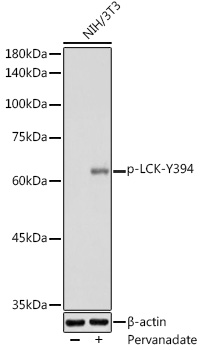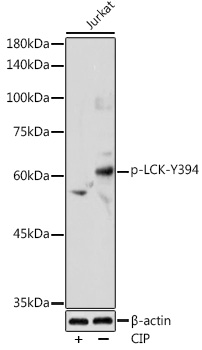Anti-Phospho-LCK-Y394 Antibody (CABP0182)
- SKU:
- CABP0182
- Product type:
- Antibody
- Application:
- WB
- Reactivity:
- Human
- Reactivity:
- Mouse
- Host Species:
- Rabbit
- Isotype:
- IgG
- Research Area:
- Immunology
Description
| 抗体名: | Anti-Phospho-LCK-Y394 Antibody |
| 抗体コード: | CABP0182 |
| 抗体サイズ: | 50uL, 100uL |
| 申し込み: | WB |
| 反応性: | Human, Mouse |
| 宿主種: | Rabbit |
| 免疫原: | A phospho specific peptide corresponding to residues surrounding Y394 of human LCK |
| 申し込み: | WB |
| 推奨希釈: | WB 1:500 - 1:2000 |
| 反応性: | Human, Mouse |
| ポジティブサンプル: | Jurkat, NIH/3T3 |
| 免疫原: | A phospho specific peptide corresponding to residues surrounding Y394 of human LCK |
| 精製方法: | Affinity purification |
| ストレージバッファ: | Store at -20°C. Avoid freeze / thaw cycles. Buffer: PBS with 0.02% sodium azide, 50% glycerol, pH7.3. |
| アイソタイプ: | IgG |
| 順序: | Email for sequence |
| 遺伝子ID: | 3932 |
| Uniprot: | P06239 |
| セルラーロケーション: | Cell membrane, Cytoplasm, Cytoplasmic side, Lipid-anchor |
| 計算された分子量: | 40kDa/58kDa/61kDa |
| 観察された分子量: | 60KDa |
| 同義語: | LCK, IMD22, LSK, YT16, p56lck, pp58lck |
| バックグラウンド: | This gene is a member of the Src family of protein tyrosine kinases (PTKs). The encoded protein is a key signaling molecule in the selection and maturation of developing T-cells. It contains N-terminal sites for myristylation and palmitylation, a PTK domain, and SH2 and SH3 domains which are involved in mediating protein-protein interactions with phosphotyrosine-containing and proline-rich motifs, respectively. The protein localizes to the plasma membrane and pericentrosomal vesicles, and binds to cell surface receptors, including CD4 and CD8, and other signaling molecules. Multiple alternatively spliced variants encoding different isoforms have been described. |
| UniProt Protein Function: | Lck: a tyrosine kinase of the Src family that is crucial to antigen-receptor signaling in lymphocytes. plays an essential role for the selection and maturation of developing T-cell in the thymus and in mature T-cell function. Is constitutively associated with the cytoplasmic portions of the CD4 and CD8 surface receptors and plays a key role in T-cell antigen receptor(TCR)-linked signal transduction pathways. Association of the TCR with a peptide antigen-bound MHC complex facilitates the interaction of CD4 and CD8 with MHC class II and class I molecules, respectively, and thereby recruits the associated LCK to the vicinity of the TCR/CD3 complex. LCK then phosphorylates tyrosines residues within the immunoreceptor tyrosines-based activation motifs (ITAMs) in the cytoplasmic tails of the TCRgamma chains and CD3 subunits, initiating the TCR/CD3 signaling pathway. In addition, contributes to signaling by other receptor molecules. Associates directly with the cytoplasmic tail of CD2, and upon engagement of the CD2 molecule, LCK undergoes hyperphosphorylation and activation. Also plays a role in the IL2 receptor-linked signaling pathway that controls T-cell proliferative response. Binding of IL2 to its receptor results in increased activity of LCK. Is expressed at all stages of thymocyte development and is required for the regulation of maturation events that are governed by both pre-TCR and mature alpha beta TCR. Binds to the cytoplasmic domain of cell surface receptors, such as CD2, CD4, CD5, CD8, CD44, CD45 and CD122. Also binds to effector molecules, such as PI4K, VAV1, RASA1, FYB and to other protein kinases including CDC2, RAF1, ZAP70 and SYK. Binds to phosphatidylinositol 3'-kinase (PI3K) from T-lymphocytes through its SH3 domain and to the tyrosine phosphorylated form of Sam68 through its SH2 domain. Binds to HIV-1 Nef through its SH3 domain. This interaction inhibits its tyrosine-kinase activity. Overexpression in mice leads to thymic tumors. Aberrant expression is seen in T cell leukemias and colon cancer. The leukemic translocation t(1;7)(p34;q34) has breakpoints at the T cell receptor gene and close to the Lck promoters, can cause increased Lck expression, and in one case, point mutations. A mutated Lck has also been seen in a cell line. One patient with aberrant Lck splicing suffered from SCID-like T cell deficiency. Inhibitor: BMS-279700. Three alternatively spliced isoforms of the human proteinhave been described. |
| UniProt Protein Details: | Protein type:Protein kinase, tyrosine (non-receptor); EC 2.7.10.2; Protein kinase, TK; Oncoprotein; Kinase, protein; TK group; Src family Chromosomal Location of Human Ortholog: 1p34.3 Cellular Component: pericentriolar material; extrinsic to internal side of plasma membrane; endocytic vesicle; plasma membrane; immunological synapse; intercellular junction; cytosol; lipid raft Molecular Function:protein C-terminus binding; identical protein binding; CD8 receptor binding; non-membrane spanning protein tyrosine kinase activity; protein serine/threonine phosphatase activity; antigen binding; protein kinase binding; protein phosphatase binding; ATPase binding; protein binding; protein-tyrosine kinase activity; protein complex binding; phosphoinositide 3-kinase binding; SH2 domain binding; glycoprotein binding; CD4 receptor binding; ATP binding Biological Process: nerve growth factor receptor signaling pathway; viral reproduction; protein amino acid phosphorylation; T cell receptor signaling pathway; B cell receptor signaling pathway; positive regulation of T cell receptor signaling pathway; hemopoiesis; positive regulation of gamma-delta T cell differentiation; aging; T cell differentiation; caspase activation; response to drug; regulation of lymphocyte activation; epidermal growth factor receptor signaling pathway; platelet activation; phosphoinositide-mediated signaling; fibroblast growth factor receptor signaling pathway; cellular zinc ion homeostasis; regulation of defense response to virus by virus; regulation of cell proliferation; positive regulation of tyrosine phosphorylation of Stat5 protein; response to hydrogen peroxide; dephosphorylation; response to mechanical stimulus; response to zinc ion; release of sequestered calcium ion into cytosol; T cell costimulation; innate immune response; positive regulation of T cell activation; blood coagulation; leukocyte migration; transmembrane receptor protein tyrosine kinase signaling pathway Disease: Immunodeficiency 22 |
| NCBI Summary: | This gene is a member of the Src family of protein tyrosine kinases (PTKs). The encoded protein is a key signaling molecule in the selection and maturation of developing T-cells. It contains N-terminal sites for myristylation and palmitylation, a PTK domain, and SH2 and SH3 domains which are involved in mediating protein-protein interactions with phosphotyrosine-containing and proline-rich motifs, respectively. The protein localizes to the plasma membrane and pericentrosomal vesicles, and binds to cell surface receptors, including CD4 and CD8, and other signaling molecules. Multiple alternatively spliced variants, encoding the same protein, have been described. [provided by RefSeq, Jul 2008] |
| UniProt Code: | P06239 |
| NCBI GenInfo Identifier: | 125474 |
| NCBI Gene ID: | 3932 |
| NCBI Accession: | P06239.6 |
| UniProt Secondary Accession: | P06239,P07100, Q12850, Q13152, Q5TDH8, Q5TDH9, Q7RTZ3 Q96DW4, Q9NYT8, D3DPP8, |
| UniProt Related Accession: | P06239 |
| Molecular Weight: | Calculated Molecular Weight: 40kDa/58kDa/61kDaObserved Molecular Weight: 55kDa |
| NCBI Full Name: | Tyrosine-protein kinase Lck |
| NCBI Synonym Full Names: | LCK proto-oncogene, Src family tyrosine kinase |
| NCBI Official Symbol: | LCK |
| NCBI Official Synonym Symbols: | LSK; YT16; IMD22; p56lck; pp58lck |
| NCBI Protein Information: | tyrosine-protein kinase Lck; leukocyte C-terminal Src kinase; p56(LSTRA) protein-tyrosine kinase; t cell-specific protein-tyrosine kinase; proto-oncogene tyrosine-protein kinase LCK; lymphocyte-specific protein tyrosine kinase; lymphocyte cell-specific protein-tyrosine kinase; T-lymphocyte specific protein tyrosine kinase p56lck |
| UniProt Protein Name: | Tyrosine-protein kinase Lck |
| UniProt Synonym Protein Names: | Leukocyte C-terminal Src kinase; LSK; Lymphocyte cell-specific protein-tyrosine kinase; Protein YT16; Proto-oncogene Lck; T cell-specific protein-tyrosine kinase; p56-LCK |
| Protein Family: | Tyrosine-protein kinase |
| UniProt Gene Name: | LCK |
| UniProt Entry Name: | LCK_HUMAN |



